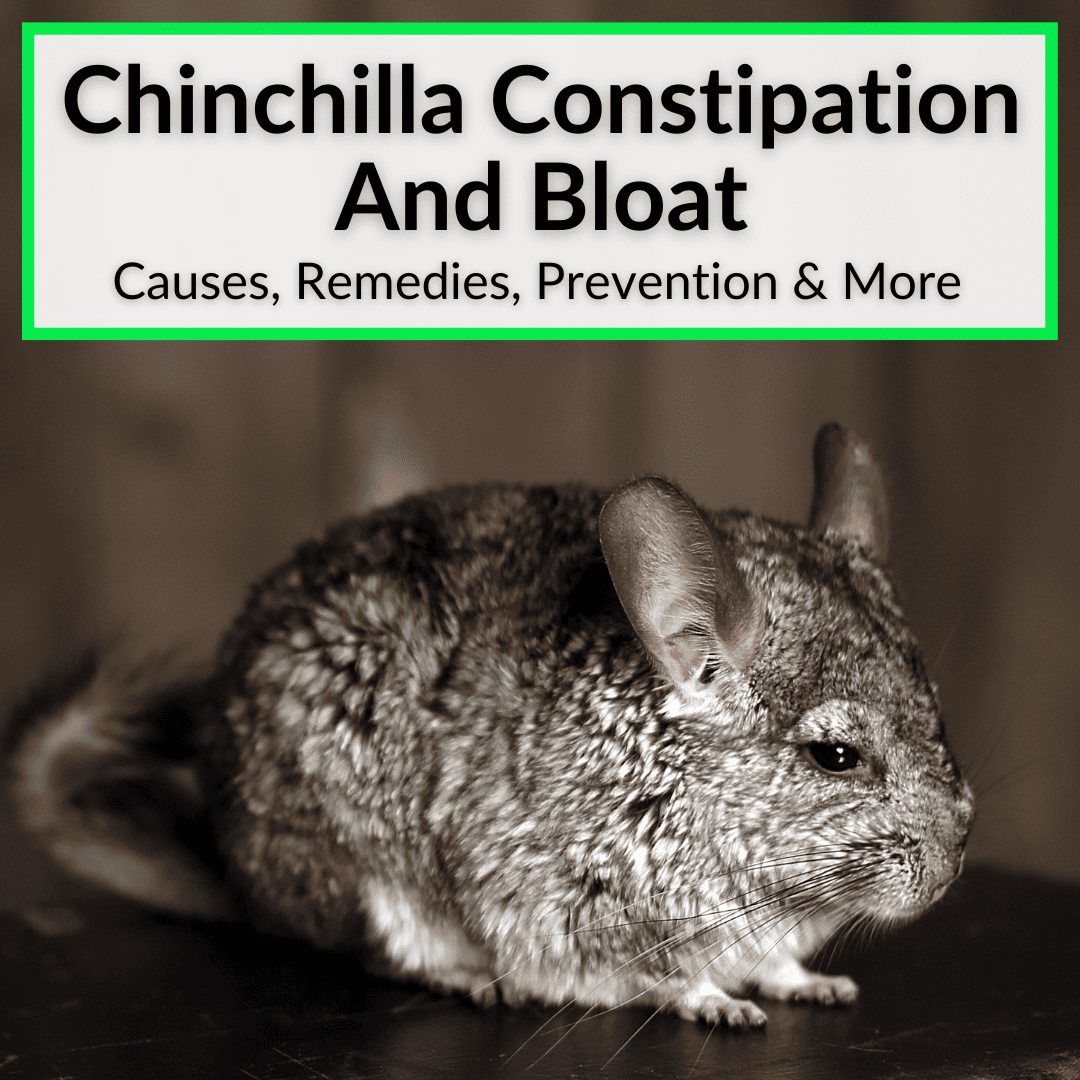
Their diet of hay and food pellets may not sound exciting, but don’t worry.
They don’t mind. And their stomachs and intestines are love it. Fiber is vital for chinchillas.
If they don’t get enough of it, they will suffer.
Chinchilla constipation is almost guaranteed. Chinchilla bloat can also result from dietary issues.
Both can quickly turn serious.
That’s why you really should keep your pet on that same, boring diet. And you should know how to recognize constipation or bloating.
Keep reading to learn all about bloating and constipation in chinchillas, including how to recognize it, what to do about it, and how to prevent it in the first place.
Contents
- 1 Chinchilla Constipation
- 2 Chinchilla Bloat
- 3 Issues Related To Bloat And Constipation
- 4 Chinchilla Not Pooping Or Bloated: Final Thoughts
Chinchilla Constipation
Chinchilla constipation is effectively the same as human constipation, but due to their small size, it is far more dangerous. It can occur due to a diet lacking fiber, dehydration, or inadequate exercise.
Let’s take a close look at the possible causes, before getting into treatment and prevention.
Causes Of Chinchilla Constipation
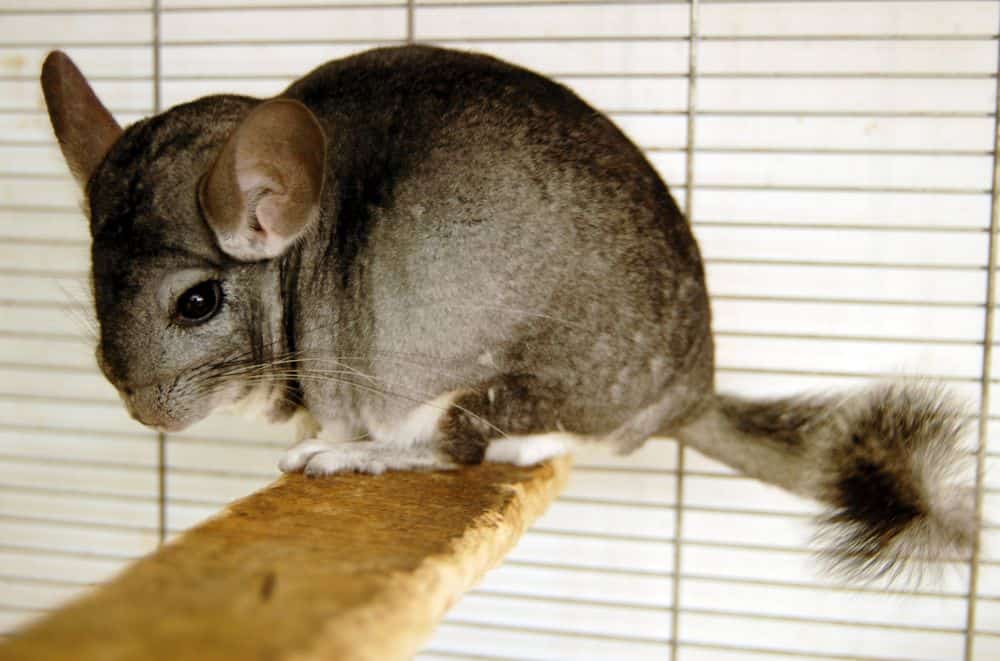
Here are some common causes of constipation in chinchillas.
Lack Of Dietary Fiber
Chinchillas need a high-fiber diet. Your pet gets most of its fiber from Timothy hay, which has the advantage of being low in calcium. Some other types of hay may be high in calcium, which can cause bladder stones in chinchillas.
Additionally, you should feed your chinchilla commercial chinchilla pellets. Look for pellets that are also high in fiber. You can supplement the diet with fruits (in moderation), certain vegetables, or other treats.
But the majority of the diet should be hay and pellets, to ensure your pet gets all the fiber it needs. Without fiber, it could suffer from dry, hard poop or difficulty pooping.
Dehydration Or Lack Of Water Intake
Chinchillas need about two ounces of water per day. If your pet is not drinking adequate amounts of water, it could suffer from hard, dry stool and difficulty during defecation.
Lack Of Exercise
Chinchillas need at least an hour or two of physical activity on a daily basis. In the wild, they forage for food, hide from predators, and climb and jump.
Your captive chinchilla needs to do similar movements indoors to keep its bowel movements regular. Provide your chinchilla with toys and daily out-of-cage time for social interaction. It needs to play with other chinchillas, or with you, if you only have the one chinchilla.
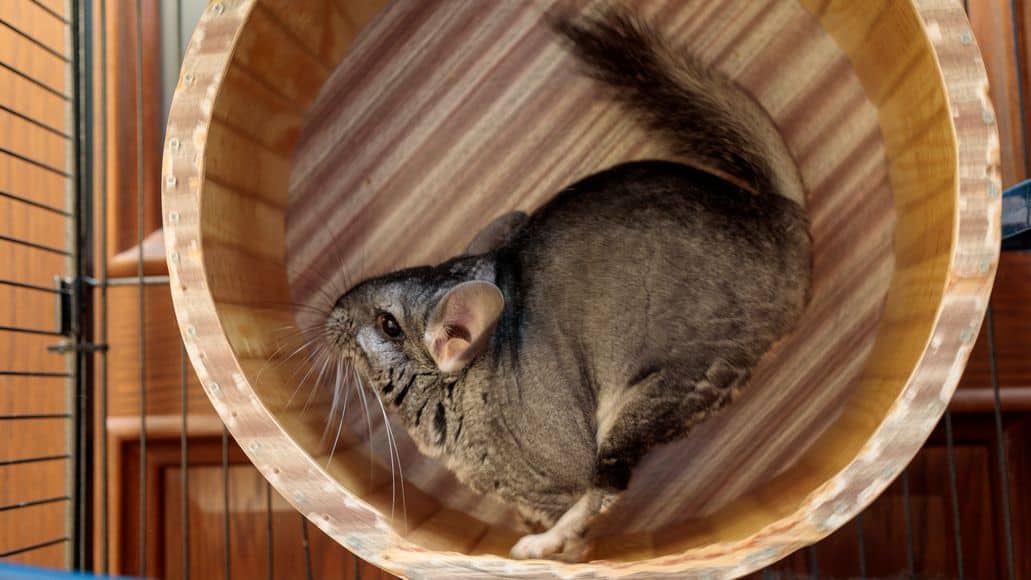
Other Health Issues
Chinchillas could also get constipated if they have intestinal parasites like tapeworms. Sometimes, chinchillas eat their bedding, which can result in intestinal blockages or impaction. This, too, could stop your pet from pooping.
In rare cases, a dangerous condition called intussusception can cause the intestines of a chinchilla to fold inside themselves, resulting in intestinal blockage.
Pregnancy, inadequate fiber in the diet, poor water intake, or inflammation of the intestines can all cause this type of constipation. Intussusception needs surgical intervention.
Dental diseases can also cause constipation since affected chinchillas aren’t able to chew their food or tend to avoid fibrous foods and pellets.
Signs And Symptoms Of Chinchilla Constipation
- The chinchilla may strain to defecate
- It produces very few to no fecal pellets
- It may produce thin, hard, smaller-than-normal pellets stained in blood
- Abdominal pain
Treatment For Constipation In Chinchillas
For mild cases of constipation in chinchillas, the vet might recommend dietary changes with more roughage in the diet.
The treatment will also focus on the rehydration of your chinchilla’s GI tract. Some chinchillas benefit from fluid therapy to rehydrate their dehydrated gut. Veterinarians also recommend pain medications (like buprenorphine) for constipated chinchillas with abdominal pain.
Chinchilla Bloat
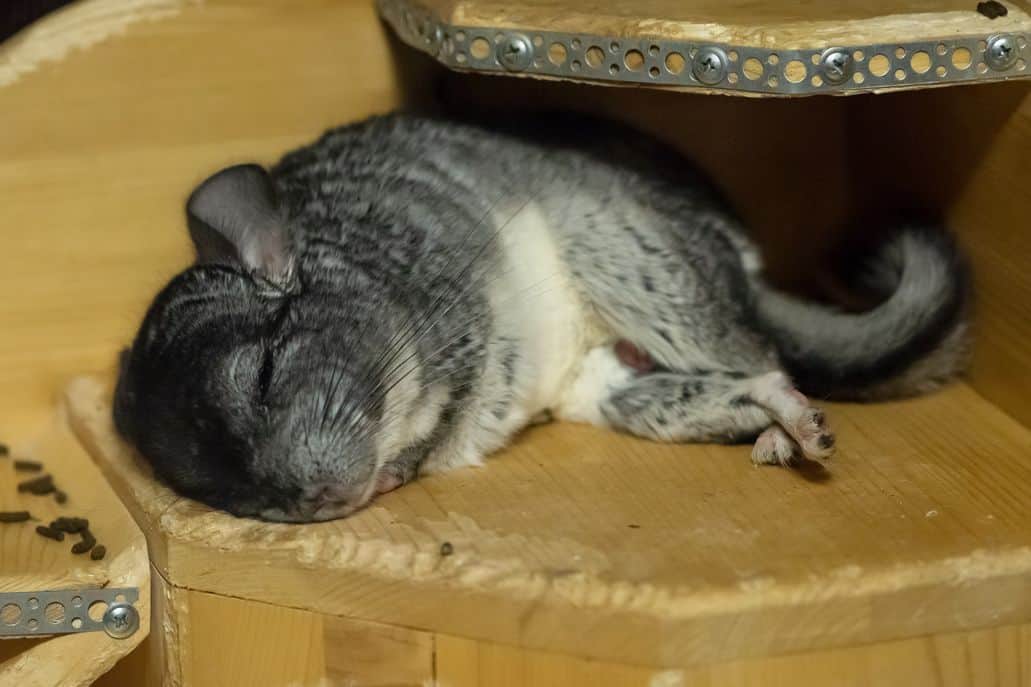
Bloat in chinchillas is a life-threatening condition that you must not ignore. Signs of bloat include a swollen or distended abdomen, breathing difficulty, and lethargy. If your chinchilla is bloated and appears lethargic or in distress, please take it to the vet right away.
Causes Of Bloating In Chinchillas
- Bloat, or tympany, in chinchillas results from dietary changes and eating too fast
- Lactating female chinchillas are often known to suffer from bloating 2-3 weeks postpartum due to hypocalcemia
- Excess gas in the intestines due to certain bacterial flora can also cause chinchilla bloat
Signs And Symptoms
- Lethargy and distress
- Painful, distended abdomen
- The chinchilla might roll or stretch on the floor to relieve the discomfort
Treatment For Chinchilla Bloat
- The vet will pass a tube into the stomach to relieve gas buildup
- Lactating female chinchillas with bloat respond well to IV administration of calcium gluconate
Issues Related To Bloat And Constipation
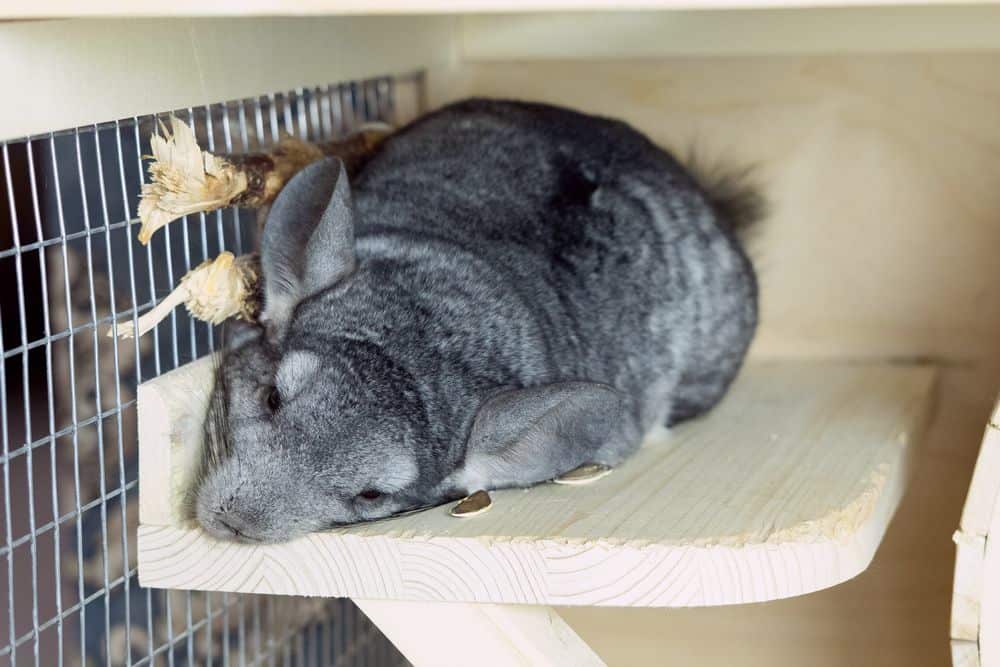
Next, we will take a look at some other issues that are similar to constipation or bloating. We will also talk a bit more about possible causes of lethargy (a primary symptom of bloating) and the dangers of a diet lacking in fiber.
Signs Of Impaction In Chinchillas
Here are some of the most common signs of impaction in chinchillas.
- Straining to defecate: an impacted chinchilla will show signs of pain while pooping. It might show discomfort when trying to pass stool.
- Stool changes: An impacted chinchilla will have reduced fecal output. The feces may be hard, small, or sometimes, totally absent. There may be traces of blood on them if the stools are dry and hard.
- Abdominal distension: Chinchillas that are impacted may have hard, distended bellies. They may hunch over, roll on the floor, or stretch to relieve that pain.
- Refusal to eat: Chinchillas with an impaction might refuse food. This may result in weight loss over time.
- Behavioral changes: Chinchillas in discomfort or pain may exhibit changes in their behavior. They may become more irritable, lethargic, aggressive, and/or display signs of distress such as teeth grinding or excessive grooming.
Signs Of Mastitis In Chinchillas
Mastitis is a bacterial infection that affects the animal’s mammary glands. It is seen in postpartum and lactating chinchillas and may be chronic or acute.
It is usually caused by unsanitary conditions, trauma caused by the kits, or systemic infections. The following are the signs of acute mastitis in chinchillas.
- Hot and painful mammary glands
- Acute mastitis can result in septic mastitis, which is accompanied by fever, depression, lethargy, and anorexia
- The mother chinchilla might ignore her neonates, due to which the offspring won’t thrive
Symptoms Of Pyometra In Chinchillas
Pyometra is a uterine infection caused by hormonal or structural changes in the uterus, as well as bacteria such as E. coli. Older female chinchillas that haven’t been bred could also suffer from pyometra.
Chinchilla pyometra is of two types: open and closed pyometra.
An open pyometra causes pus and bloody discharge to flow out through the cloaca opening. Chinchilla owners often mistake this for menstruation, but chinchillas do not menstruate (although they have an estrus cycle). The pus or bloody discharge tends to have a foul smell.
A closed pyometra causes the pus to collect inside the uterus, resulting in abdominal swelling. Closed pyometra is often diagnosed too late, which results in sepsis or peritonitis (inflammation of the peritoneum). If left untreated, closed pyometra can also result in the rupturing of the uterus.
Signs of both types of pyometra also include:
- Lack of appetite
- Swollen, distended abdomen
- Behavioral changes, including lethargy and aggression
- Shaking
- Loss of balance
- Hunched posture
- Increased fluid intake and increased urination
Why Is My Chinchilla Suddenly Lethargic?
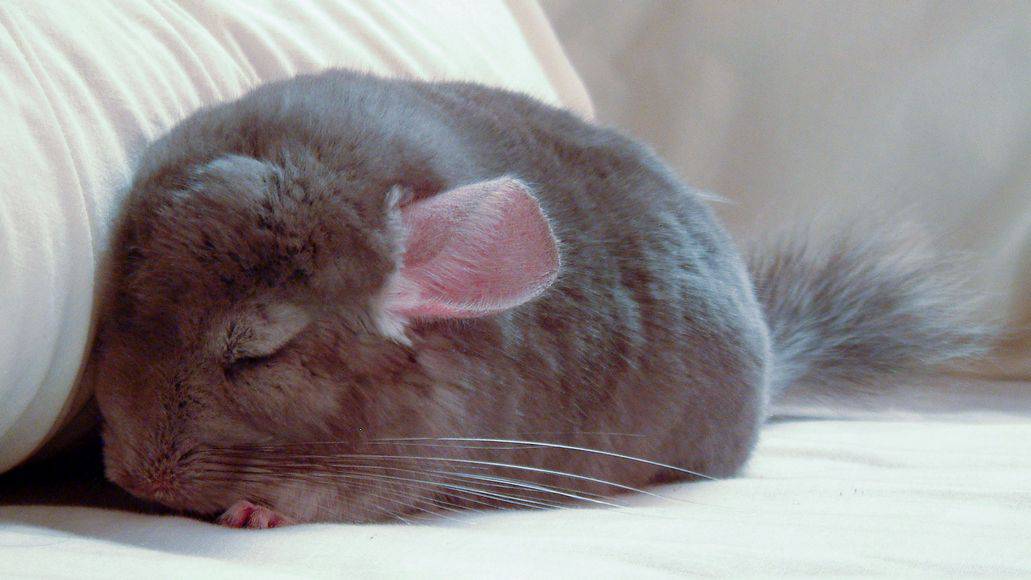
There are various factors that can result in chinchilla lethargy They include the following.
Illness Or Pain
Lethargy is a common side effect of many health issues in chinchillas, including gastrointestinal issues like constipation and bloat. Respiratory infections, intestinal parasites, etc. can also cause lethargy.
If your chinchilla is also showing other symptoms like lack of appetite, hiding, or abnormal behavior like aggression, please see your vet.
Environmental Stress
Chinchillas are very sensitive to changes in temperature, humidity, light, sound, etc. Any changes in these environmental factors can cause lethargy and stress in these sensitive pets.
Provide a quiet location for your chinchilla’s enclosure, away from loud noises, bright light, cold drafts, and heating vents. Maintain the temperature between 60° and 74° F (16° to 23° C) and ensure that the relative humidity is less than 60%.
Inadequate Mental Stimulation
Your clever chinchilla needs mental exercise in addition to physical activity. Without mental and physical stimulation, your chin could get bored, depressed, lethargic, and inactive. This can result in obesity, which, in turn, can cause a host of health issues.
Provide your furry companion with a stimulating environment and plenty of opportunities for exercise.
Natural Aging
As chinchillas get older, they tend to become less active. Some even become lethargic. Keep an eye on your pet to make sure that its lethargy is age-related inactivity and not due to an illness. If you notice signs of pain or behavioral changes in your chinchilla, please see your vet immediately.
How To Treat GI Stasis In Chinchillas
GI stasis, or gut stasis, in chinchillas, usually results from overconsumption of high-energy commercial pellets. It can be potentially life-threatening and should be treated as an emergency.
The key principle in treating chinchillas with GI stasis is to rehydrate the chinchilla and its stomach contents, alleviate pain, provide proper nutrition, and treat the underlying causes. Fluid therapy is necessary for recovery.
What Can Happen If A Chinchilla Does Not Get Enough Fiber?
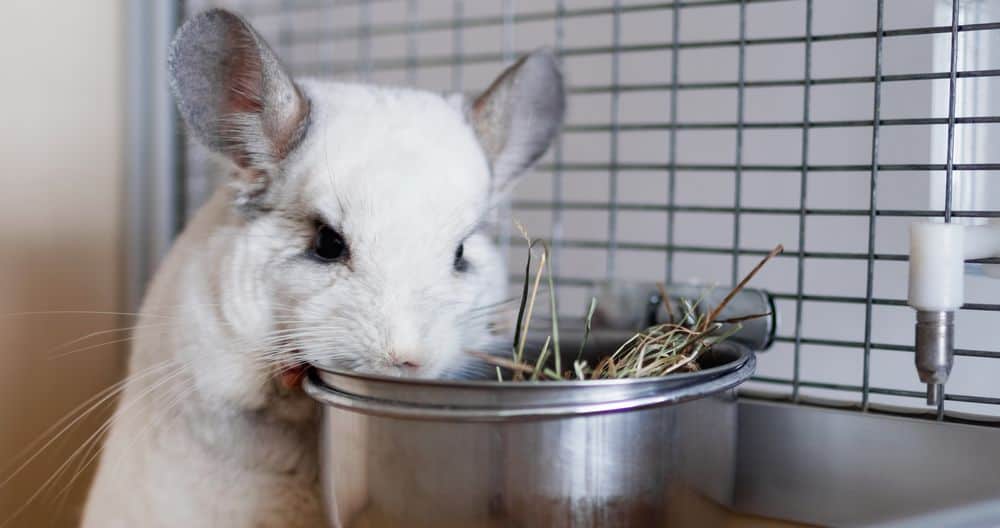
Chinchillas need a high-fiber diet for their gut and dental health.
Without fiber, the chinchilla could suffer constipation. A lack of fiber may even cause inadequate bowel movements and impaction. This can result in other gastrointestinal issues like impaction, bloat, intussusception, etc.
Furthermore, a lack of fiber can cause chinchillas’ teeth to overgrow. The roughage in hay and grass wears down their teeth, preventing them from overgrowing. Without fiber in the diet, a chinchilla’s rootless teeth will continue to grow and may even turn inward to cause abscesses, dental fractures, etc.
Can Chinchillas Burp?
No, chinchillas can not burp. That is one reason any build up of gas in their bodies quickly leads to bloating. Can chinchillas fart? No, they can not fart either. They have no way to release gas.
Chinchilla Not Pooping Or Bloated: Final Thoughts
Chinchilla constipation is usually the result of a diet lacking in fiber. That makes it an easy fix and something you should be able to prevent. Bloating in chinchillas can also result from dietary issues, as well as other causes.
Bloat is even more serious that constipation. It can quickly become deadly. That is why you should get your pet to the vet as soon as you recognize the symptoms of bloating. With constipation, you may be able to fix the issue by giving your pet more fiber, but if it does not improve quickly, give you vet a call for this problem, too.
anita M rosinola says
I had adopted
a female chinchilla 4 years ago and she came out of a not so good home. I gave her lots of love and things she never got from the other people who had her and they had her for about 7 years . She just passed away five days ago. i am devasted and beating myself up . I can’t cry enough tears but I know this doesn’t help. I gave her Oxbow hay and pellets. She alwa ys had at least an hour or more in a play area. She was about 10-11 years old. I had a male for 15 and a half years before her who passed away. I can’t help worry that I may have been able to prevent what happened. She has had issues in the past once in a while with not pooping much. The days prior to her passing she was eating playing jumping around,,,not as much but still seemed fine to me. She let me pet her and she loved her evenig treat which either consisted of oxbow barley busicuit sometimes rosehips. and if I thought she was a little slight on poops Id give her a little fresh pumpkin. Never sugar or salt or anything like that. She died in the early morning hours. I went to bed around 11:30 said goodnight to her and she was sitting uo on her shelf and I gave her one willow stick that she loved. she also lover applewood sticks. she seemed ok …I woke up around 6 am and heard an unfamiliar sound coming from her. I rushed into her and found her lying on her belly and her hind legs stretched out behind her. I’d never seen her like that. she still felt warm and her body was just lifeless when I picked her up. she was like a ragdoll.
I just can’t understand what happened in that short span of time from when I said goodnight until that moirning. the sound was like none I’ve ever heard from a chin. I thought I was vigilant about looking for signs of illness but she wasn’t displaying any signs the evening before or I would have done anything to prevent it.
She was pooping but I did think they were a bit smaller than sometimes when she had bigger ones. sometimes it was a mixture of small and large but not too large. There wasn’t a time when I didn’s see any poops. she was a large chinchilla. about 1000 grams or so last visit to the vet.,. her previous owners never
took her to a vet and had her on the crappiest food. Only let her out once a week when they cleaned her cage which was too small for a chin. I am so devasted and feel I overlooked something and now I will never forgive myself. she is gone now …. jI guess i’m looking everywhere for answers as to what may have caused her sudden death when she seemed ok when I said good night to her. Maybe you can shine a light on what could have caused this. The way I found her haunts me, She felt as if she was filled with fluid and very very heavy. I would appreciate any thoughts. Thank you.